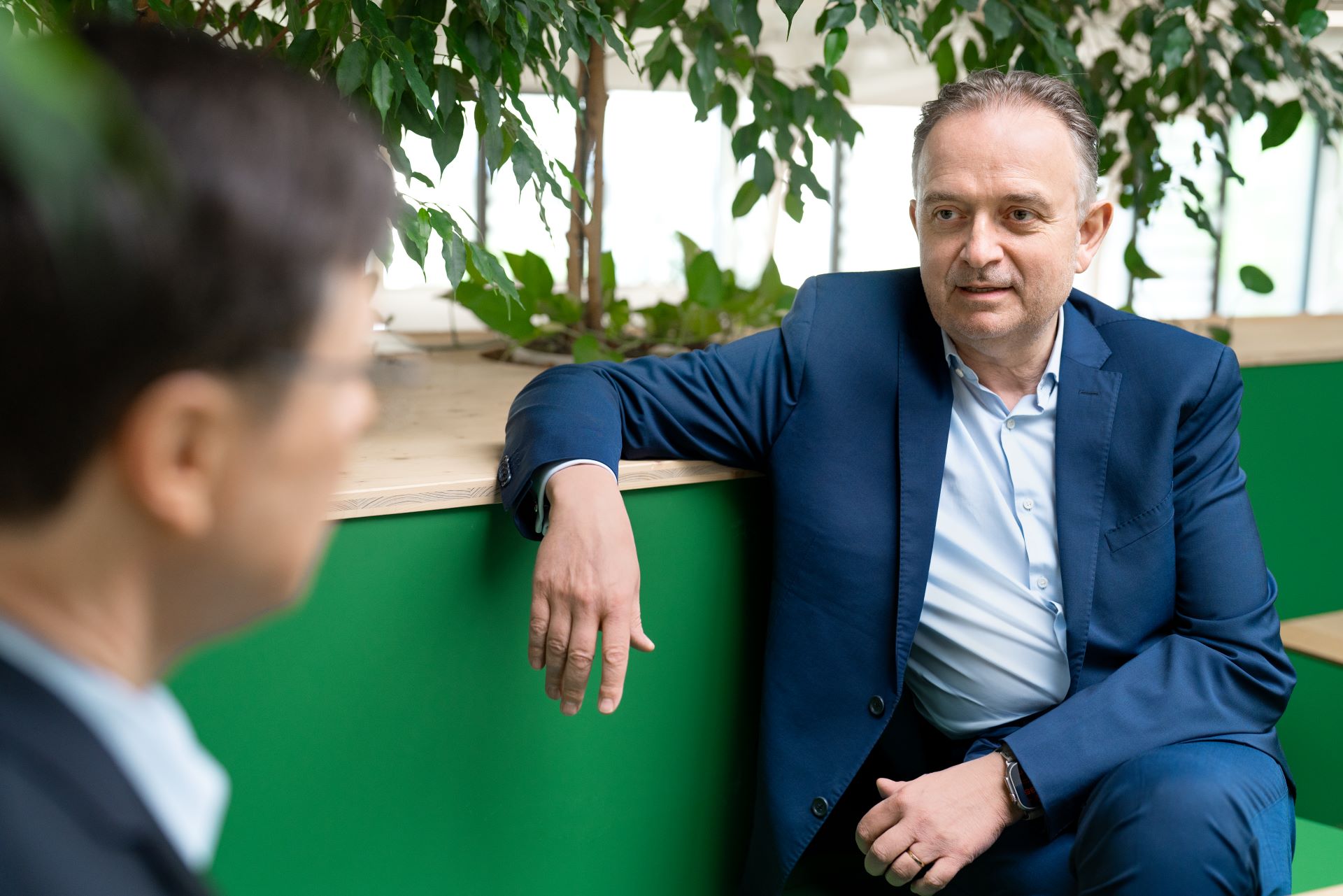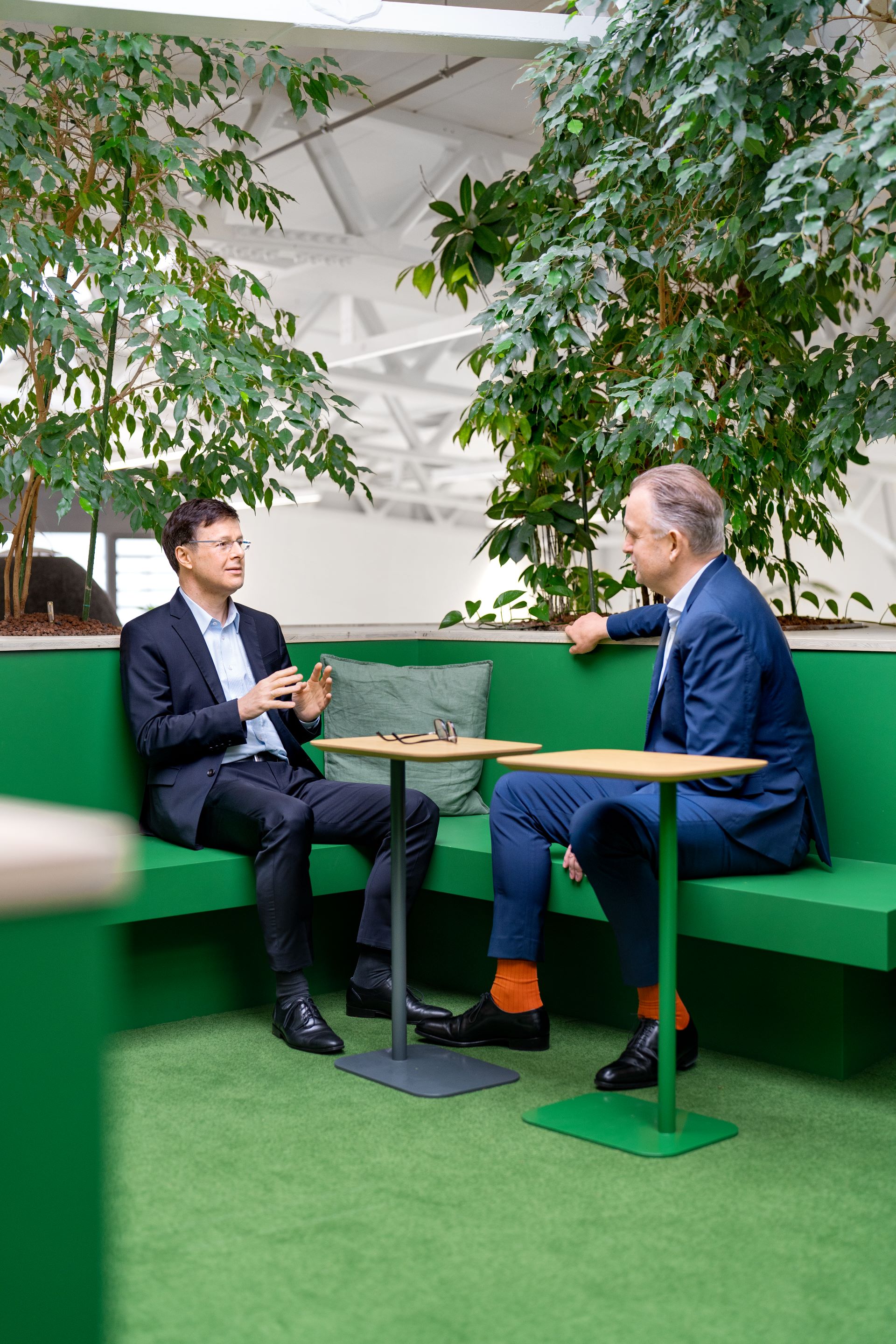
Jean-François Roche is Senior Vice President and Head of International Sales at packaging specialist Graphic Packaging International (GPI).
In his career, he has already gained around three decades of experience in the packaging market. Since 2017, Roche has also been President of the European Carton Makers Association (ECMA), the European association of the folding carton industry.

Jean-François Roche - Good afternoon, it’s a pleasure to be here. I suspect that HEIDELBERG and GPI have crossed paths several times on my way here today.
Ludwin Monz - Do you mean in terms of packaging? That’s probably true. You’ve almost certainly had an everyday product in your hands whose packaging was produced on a HEIDELBERG machine.
Jean-François Roche - Yes, it’s hard to imagine a world without packaging. And we see consumer goods in particular as a great business area that will continue to grow. The outlook for paperboard-based packaging for products such as food or hygiene articles is particularly promising: solid growth is forecast for such packaging solutions over the next few years, while plastics might lose market share. Looking back, paperboard-based packaging has always developed in line with gross domestic product. Currently, there is an additional tailwind due to requirements from sustainability initiatives, and we anticipate growth rates of an additional 2 to 4 percent as packaging made from fiberbased materials, i.e. primarily paperboard, replaces that made for plastics.
Ludwin Monz - This reinforces the trend towards environmentally friendly materials.
Jean-François Roche - Exactly. We can see that customers want more environmentally friendly packaging. Legislation is also moving in this direction. But there are also challenges for paperboard-based packaging in terms of further improving its recyclability. Innovation is the key to being successful in the future. Our goal at GPI is to make every product innovation more circular, more functional and more convenient than existing alternatives.
Ludwin Monz - The exciting thing about such innovations is that they are the result of collaboration between many scientific fields. Here at HEIDELBERG, as a manufacturer of printing and finishing machines, many of them come together. It starts with mechanics, continues with electronics and data science, and ends with chemistry. HEIDELBERG is an integral part of the value chain for paperboard-based packaging, which means that we benefit directly from the structural growth in this market. We expect the production of paper-based packaging to increase over the next few years. And our customers need to cope with that.

Jean-François Roche - Yes, we at GPI do this very consistently and are therefore constantly expanding our innovative strength in such packaging as a substitute for plastic. There are also practical hurdles: Companies in the consumer goods industry are trying to reduce their packaging costs, and paperboard-based packaging is generally more expensive than plastic packaging. But at the same time, consumer pressure is increasing. Consumers have spoken and are aware of the significance of their purchasing decisions and impacts on the planet.
Ludwin Monz - I fully agree with that. Sustainability is an overarching trend and probably the strongest growth driver in this market. We are aligning our offering in the Packaging Solutions segment accordingly. Innovation remains the key to enabling sustainable change for our customers. From a regional perspective, our analyses show that this is not only true in Europe. We also see considerable growth opportunities in Asia: the growing world population and increasing prosperity are strong growth drivers. HEIDELBERG is well positioned in this region and intends to take advantage of these opportunities.
Jean-François Roche - The momentum in Asia is very strong. That is true. However, in terms of consumer awareness and legislation, the US and the EU are clearly the drivers for a more sustainable economy. In the EU, there was recently the PPWR initiative, which stands for Packaging and Packaging Waste Regulation. The aim of the regulation is to categorize packaging according to its recyclability and ultimately to ensure that all packaging on the European market is recyclable. Paperboard-based packaging is already “best-in-class” in this respect, but there is still plenty of room for improvement. Higher recycling rates through better collection for example. Or the reduction of so-called EPR fees, the costs for extended producer responsibility, under which companies bear responsibility for a product throughout its entire life cycle. In addition to regulatory requirements, the sustainability of packaging is primarily about the needs of consumers, but also about the very practical requirements of manufacturers and brands. For us as a packaging manufacturer, this means that we must take a holistic view of the optimization levers.

Ludwin Monz -That’s right! HEIDELBERG is also playing its part and wants to be a pioneer. We see sustainability as part of every stage of the value chain, and it begins in the manufacturing process, where the greatest leverage for reducing emissions lies. A lot can be saved here through intelligent assistance systems and innovative product design. HEIDELBERG has a strong track record in this area: if you compare the current Speedmaster XL 106-6+L with its predecessor from 1990, for example, the energy consumption of the press is 40 percent lower today than it was around 30 years ago. Other innovations such as our dryer technology, which was further improved with the drupa 2024 generation, will soon contribute to further improvements. We also have the technologies to realize the production of sustainable packaging. Our machines can process all types of substrates, inks and coatings, offering maximum flexibility in the development of new sustainable packaging designs.
Jean-François Roche - That is important. Because when we look at the trends for packaging design, we expect the proportion of recycled fibers and virgin fibers for direct food contact applications to continue to increase. We also assume that packaging will be optimized in terms of volume and weight so that the focus is on ensuring that it can fulfill its core function. This will bring us closer to the goal of reducing packaging per capita, which will also lead to a lower carbon footprint.
Ludwin Monz -Barrier coatings are certainly another key to GPI.
Jean-François Roche - Exactly, especially for food and beverage packaging. Barriers available today don’t always meet the highest requirements for recyclability. So, we need to make sure that we use them as little as necessary. In the longer term, research will make progress on naturally occurring biopolymers that can be used to increase the proportion of renewable materials. There are also biodegradable materials that are suitable for compostable packaging. However, we assume that the changed requirements in the EU will also influence the markets in North America, as our customers are international. This will bring further movement to the topic.
Ludwin Monz - Our teams are definitely ready to act as pioneers and support packaging manufacturers in their further development. This means that we will bring innovative technologies to the market that will give our customers a competitive edge. We will continue to improve waste management and energy efficiency, helping to reduce emissions along the value chain.